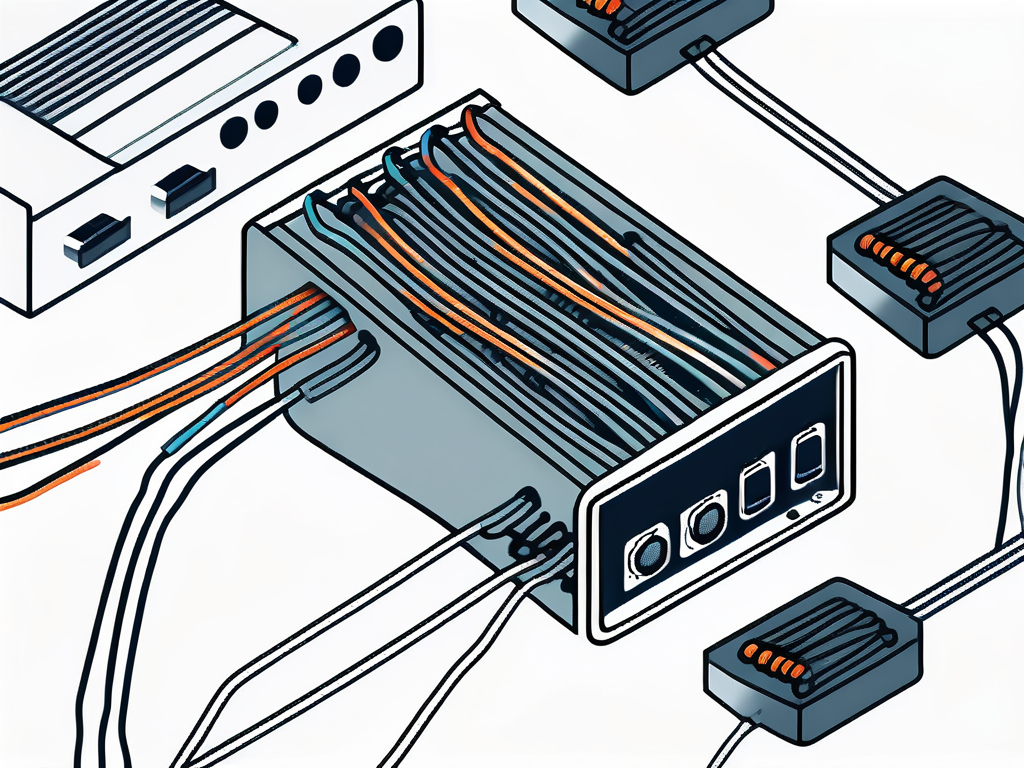IT Support

IT support services are essential for organizations of all sizes in today's digital age. With the increasing reliance on technology, businesses need reliable and efficient IT support to ensure smooth operations. This guide aims to provide a comprehensive understanding of IT support services, including their definition, importance, different types, and how to choose, implement, manage, and evaluate them effectively.
Understanding IT Support Services
Definition and Importance of IT Support Services
IT support services refer to the range of activities provided by IT professionals to address and resolve technical issues faced by individuals or organizations. These services encompass hardware and software troubleshooting, network maintenance, system upgrades, data and security management, and user assistance.

The importance of IT support services cannot be overstated. By having competent and reliable IT support, organizations can minimize downtime, increase productivity, enhance data security, and ensure the smooth functioning of their IT infrastructure.
Moreover, IT support services play a crucial role in fostering innovation and driving business growth. With the rapid evolution of technology, IT support professionals not only fix issues but also offer strategic guidance on adopting new technologies and optimizing existing systems. This proactive approach helps organizations stay competitive in the digital landscape and adapt to changing market demands.
Different Types of IT Support Services
IT support services can be broadly categorized into two types: remote and on-site support.
Remote support involves resolving technical issues without the need for physical presence. IT professionals can access and troubleshoot systems remotely, saving time and resources. On the other hand, on-site support requires IT technicians to visit the location, which is beneficial when hands-on assistance or hardware repairs are needed.
Furthermore, IT support services can be specialized based on specific areas, such as help desk support, network administration, software development, cybersecurity, and infrastructure management. Organizations can choose the types of IT support services that align with their requirements and budget. PSee Solutions offers comprehensive IT Managed Services, Cloud Services, and Network Security Services to cater to diverse organizational needs and ensure optimal functionality and security of their IT infrastructure.
Additionally, IT support services can also include proactive monitoring and maintenance to prevent potential issues before they escalate. This proactive approach involves regular system checks, software updates, and security patches to ensure optimal performance and data protection. By investing in proactive IT support, organizations can avoid costly downtime and security breaches, ultimately saving time and resources in the long run.
Choosing the Right IT Support Services
When it comes to selecting the right IT support services for your organization, there are several factors that should be taken into account. These factors can greatly impact the quality of service you receive and the overall success of your IT operations. Let's explore some of these factors in more detail:
Business Requirements
Understanding your organization's specific IT needs is crucial when choosing an IT support services provider. Every business is unique, and what works for one may not work for another. Take the time to assess your current and future IT requirements, and then find a provider that can adequately fulfill those needs. This will ensure that you receive the right level of support and avoid any unnecessary complications down the line.
Expertise and Experience
When entrusting your IT operations to a service provider, it's essential to choose one with a proven track record of success. Look for a provider that has experience delivering IT support services to businesses similar to yours. This expertise will not only ensure that they understand your industry-specific challenges but also that they have the necessary skills and knowledge to address them effectively. Don't hesitate to ask for references or case studies to validate their claims.
Response Time
In today's fast-paced business environment, any downtime or technical issue can have a significant impact on your operations. Therefore, it's crucial to consider the response time of a potential IT support services provider. How quickly can they resolve technical issues? Do they have a dedicated team available 24/7? Ensuring minimal disruption to your business should be a top priority, so choose a provider that can guarantee a swift response and resolution time.
Service Level Agreement (SLA)
Reviewing the Service Level Agreement (SLA) is an essential step when selecting IT support services. The SLA outlines the scope and quality of the services provided, as well as any guarantees or penalties involved. Pay close attention to the terms and conditions, ensuring they align with your organization's needs and expectations. A well-defined SLA will provide clarity and transparency, setting the foundation for a successful partnership.
Scalability
As your business grows and technology requirements evolve, it's crucial to have an IT support services provider that can scale alongside you. Consider whether the provider has the capacity and flexibility to accommodate your future needs. Can they handle an increased workload? Are they up-to-date with the latest technological advancements? Choosing a provider that can grow with your business will save you the hassle of having to switch providers down the line.
Common Mistakes to Avoid When Choosing IT Support Services
While selecting IT support services, it's important to be aware of common mistakes that can lead to unsatisfactory outcomes. By avoiding these pitfalls, you can ensure a more successful partnership with your chosen provider:
- Choosing Based Solely on Price: While cost is an important factor, it should not be the sole determining factor. Selecting the cheapest option may result in subpar service quality and inadequate support. Consider the value and expertise a provider brings to the table, rather than just the price tag.
- Ignoring Support Channels: Communication is key when it comes to IT support. Ensure that the provider offers different communication channels, such as phone, email, or live chat, for convenient access to support. This will allow you to reach them easily and receive timely assistance when needed.
- Neglecting Service Availability: It's crucial to confirm that the provider's support hours align with your organization's operational hours. There's nothing worse than needing assistance outside of their availability. Make sure their support hours match your needs to avoid any untimely delays or frustrations.
- Overlooking Security Measures: In today's digital landscape, data security is of utmost importance. Verify that the provider follows robust security protocols to safeguard your sensitive data and systems. A breach in security can have severe consequences for your business, so don't compromise on this aspect.
- Lack of Proactive Support: Reactive support may solve immediate issues, but proactive support can prevent potential problems from arising in the first place. Opt for a provider that offers proactive maintenance and monitoring to identify and address potential issues before they disrupt your operations. This proactive approach will save you time, money, and headaches in the long run.
By considering these factors and avoiding common mistakes, you can make a more informed decision when choosing IT support services. Remember, the right provider will not only meet your current needs but also contribute to the long-term success and growth of your organization.
Implementing IT Support Services
Steps to Implement IT Support Services in Your Organization
Implementing IT support services involves a systematic approach to ensure smooth integration and maximum benefits:

- Evaluate Current IT Infrastructure: Assess the existing IT setup, identify pain points, and determine the areas where support services are required.
- Define Service Level Requirements: Clearly define the desired service levels, response times, and escalation processes to set expectations with the provider.
- Choose an IT Support Provider: Thoroughly evaluate potential providers based on their expertise, reputation, and ability to meet your specific requirements.
- Develop an Implementation Plan: Create a detailed plan outlining the timeline, resource allocation, and necessary steps for a seamless implementation.
- Transition and Training: Ensure a smooth transition from the old system to the new support services, providing necessary training to users and stakeholders.
- Monitor and Evaluate: Continuously monitor the performance of the IT support services provider and gauge their effectiveness in meeting the defined service levels.
Overcoming Challenges in IT Support Services Implementation
Implementing IT support services may present certain challenges, including:
- Resistance to Change: Prepare employees for the transition and actively communicate the benefits of the new support services to overcome resistance.
- Integration Complexity: Coordinate with the provider to ensure a seamless integration with the existing IT infrastructure, systems, and processes.
- Data Migration: Plan and execute data migration carefully to prevent any loss or corruption of critical information during the implementation process.
- User Adoption: Encourage user engagement and provide training to ensure smooth adoption of the new IT support services.
- Continuous Improvement: Establish regular communication channels with the provider to address any arising issues, suggest improvements, and refine the support services as needed.
Managing IT Support Services
Best Practices for Managing IT Support Services
Efficient management of IT support services is crucial for maximizing their effectiveness:
- Establish Clear Communication Channels: Maintain open and effective lines of communication between the organization and the support services provider.
- Regular Performance Evaluation: Continuously monitor the provider's performance based on defined metrics and address any areas of improvement or concern.
- Document Standard Operating Procedures (SOPs): Create detailed SOPs to ensure consistent delivery of support services and streamline issue resolution.
- Implement Incident and Change Management Processes: Define processes to prioritize and manage incidents, service requests, and changes effectively.
- Proactive Maintenance and Monitoring: Regularly update systems, perform security audits, and implement proactive measures to prevent issues before they occur.
Strategies for Effective IT Support Services Management
To effectively manage IT support services, consider the following strategies:
- Regular Performance Review Meetings: Conduct periodic meetings with the provider to review progress, address concerns, and ensure service levels are met.
- Continuous Improvement Initiatives: Identify areas of improvement and innovation to enhance the quality and efficiency of IT support services.
- Adopting Automation and Ticketing Systems: Utilize automation and ticketing systems to streamline issue tracking, resolution, and reporting.
- Encourage Feedback from Users: Create feedback mechanisms to collect input from users, enabling continuous improvement and addressing user satisfaction.
- Stay Updated with Technology: Keep abreast of the latest IT trends and developments to align support services with the evolving technological landscape.
Evaluating IT Support Services
Key Performance Indicators for IT Support Services
Key performance indicators (KPIs) help evaluate the effectiveness of IT support services:

- Response Time: Measure the time taken by the provider to respond to and acknowledge support requests.
- Resolution Time: Evaluate the duration required to resolve issues and restore normal operations.
- Customer Satisfaction: Gather feedback from users to gauge their satisfaction levels with the support received.
- First Call Resolution Rate: Assess the percentage of support requests resolved in the initial interaction.
- Incident Escalation Rate: Monitor the frequency of incidents requiring escalation to higher support levels.
Improving Your IT Support Services Performance
To enhance the performance of IT support services, consider the following improvement strategies:
- Continuous Training and Development: Invest in regular training programs to keep the IT support team up to date with the latest technologies and best practices.
- Effective Knowledge Management: Implement a knowledge base to document common issues, solutions, and troubleshooting steps for quick and efficient problem resolution.
- Proactive Monitoring and Prevention: Utilize monitoring tools to identify potential issues beforehand and take preventive measures to minimize disruptions.
- Regular Performance Reviews: Conduct assessments of both the IT support team and the provider to identify areas of improvement and implement necessary changes.
- User Education and Communication: Educate users about best practices, potential risks, and available support channels to minimize avoidable issues.
In conclusion, understanding, choosing, implementing, managing, and evaluating IT support services are crucial steps to ensure the seamless functioning of organizations' IT infrastructure. By following best practices, considering important factors, and adopting effective strategies, businesses can optimize their IT support services and leverage technology to drive growth and success.
-
 IT consultationExpert advice and guidance for your IT needs.
IT consultationExpert advice and guidance for your IT needs. -
 Network securityProtect your network from cyber threats.
Network securityProtect your network from cyber threats. -
 Cloud computingStreamline operations with cloud-based solutions.
Cloud computingStreamline operations with cloud-based solutions. -
 Data backup and recoveryProtect your data and recover from unexpected loss.
Data backup and recoveryProtect your data and recover from unexpected loss. -
 IT infrastructure managementEfficient management and optimization of IT infrastructure.
IT infrastructure managementEfficient management and optimization of IT infrastructure. -
 24/7 technical supportRound-the-clock technical assistance for your IT issues.
24/7 technical supportRound-the-clock technical assistance for your IT issues.
-
Mon9:00am–10:00pm
-
Tue9:00am–10:00pm
-
Wed9:00am–10:00pm
-
Thu9:00am–10:00pm
-
Fri9:00am–10:00pm
-
Sat9:00am–6:00pm
-
Sun9:00am–12:00pm